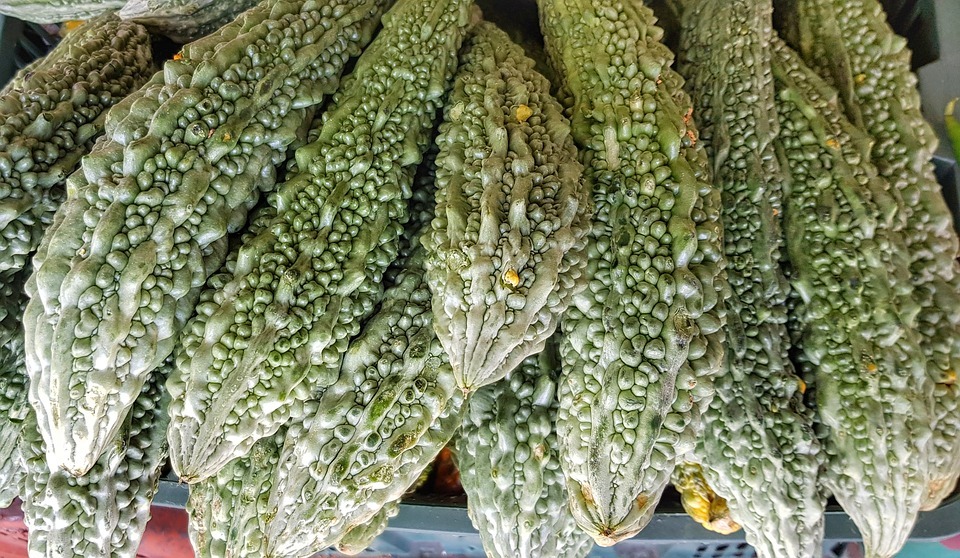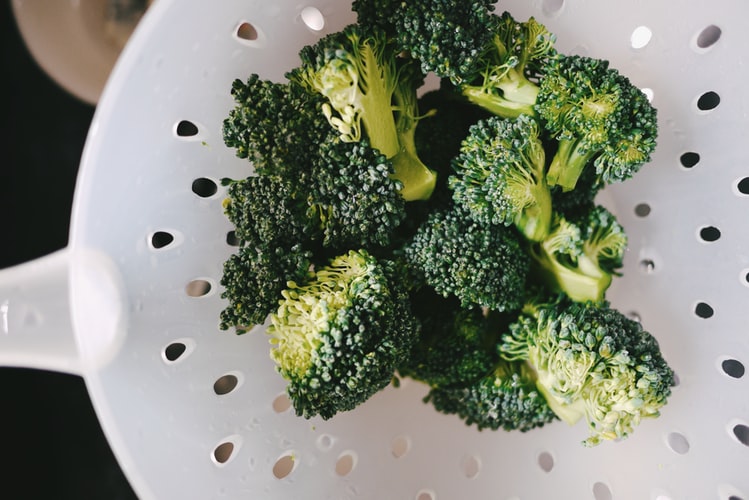Juice Vs Whole Fruit: Understanding Nutritional Differences
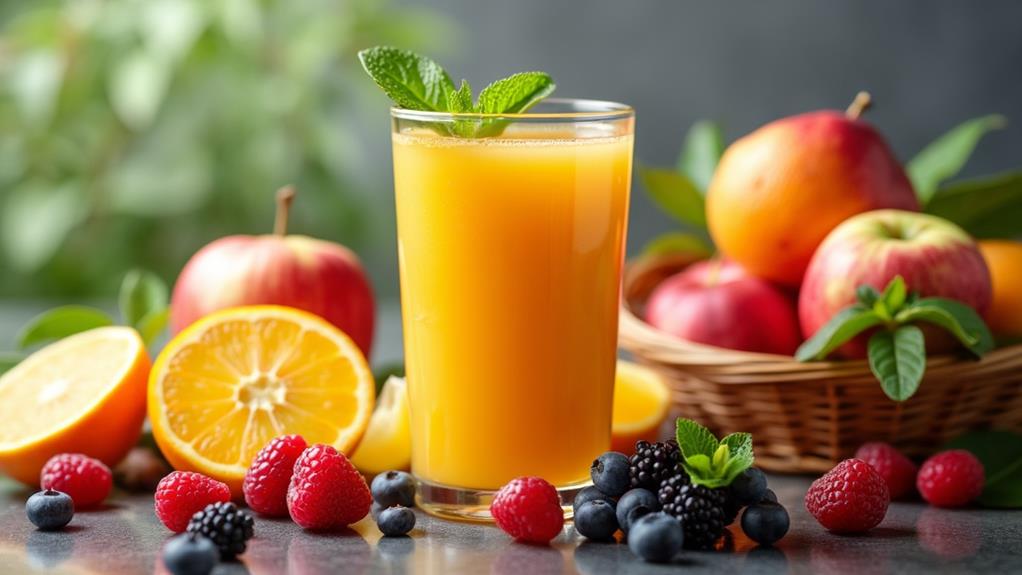
When choosing between a glass of juice and a whole fruit, it's essential to understand the nutritional differences. Juice often lacks the dietary fiber found in whole fruits, which is crucial for digestive health and blood sugar regulation. For example, consuming a medium orange provides both fiber and balanced sugar intake, whereas a cup of orange juice can result in rapid sugar absorption and increased hunger. Therefore, opting for juice over whole fruit can impact your overall health and well-being. Let's explore how these choices affect your nutritional intake and health outcomes.
Nutritional Content
When comparing the nutritional content of juice and whole fruit, whole fruits offer significant advantages. Whole fruits are rich in dietary fiber, which is fundamental for digestive health. In contrast, fruit juice typically lacks this essential component, leading to a loss of benefits such as promoting a healthy gut and aiding in weight management.
Another key difference lies in sugar content and calorie count. For example, a medium orange contains about 12 grams of sugar and 65 calories, while a cup of orange juice has approximately 21 grams of sugar and 112 calories. The higher sugar content in juice can lead to rapid spikes in blood sugar levels, unlike the slower and more stable absorption from consuming whole fruits.
Moreover, the juicing process often strips away beneficial compounds like flavonoids, which are primarily found in the pulp and skin of whole fruits. These compounds play a significant role in maintaining general health. Regular consumption of whole fruits is also linked to a lower risk of type 2 diabetes, whereas higher fruit juice consumption may increase this risk.
Fiber Importance
Choosing whole fruits over juice provides a rich source of dietary fiber that aids digestion and promotes satiety. This fiber slows the absorption of natural sugars, preventing rapid blood sugar spikes. In contrast, fruit juices lack this beneficial fiber, leading to quicker sugar absorption and less effective appetite control.
Digestive Health Benefits
Whole fruits are a powerhouse of dietary fiber essential for maintaining digestive health. Consuming whole fruits provides a rich source of dietary fiber that aids in digestion by preventing constipation, adding bulk to stool, and promoting regular bowel movements. Additionally, the fiber in whole fruits supports a healthy gut microbiome, crucial for overall digestive well-being.
Unlike fruit juices, whole fruits slow the absorption of natural sugars, helping regulate blood sugar levels more effectively. This gradual absorption prevents rapid spikes and crashes in blood sugar, reducing feelings of hunger and the likelihood of overeating.
Furthermore, fiber-rich fruits improve feelings of fullness and satiety, making it easier to manage weight by reducing overall calorie intake. The lack of dietary fiber in fruit juices can lead to digestive issues and quicker hunger return, often resulting in higher calorie consumption.
High fiber intake from whole fruits is also associated with lower risks of chronic diseases such as heart disease, diabetes, and obesity, making them a vital component of a healthy diet. So, next time you reach for a snack, consider choosing a whole fruit over juice for better digestive health.
Blood Sugar Regulation
Efficiently managing blood sugar levels is crucial, and a highly effective strategy is to consume whole fruits instead of fruit juices. Whole fruits are rich in dietary fiber, which slows the absorption of sugars into the bloodstream, resulting in more stable blood sugar levels. In contrast, fruit juice lacks this fiber, leading to rapid spikes in blood sugar that can be detrimental over time.
The fiber in whole fruits not only aids in blood sugar regulation but also promotes satiety, helping to prevent overeating and subsequent fluctuations in blood sugar. Research indicates that consuming whole fruits is associated with a lower insulin response and a reduced risk of developing type 2 diabetes, compared to fruit juice intake, which tends to elevate insulin levels. For instance, a cup of orange juice contains 21 grams of sugar, whereas a medium orange has only 12 grams, highlighting how juice can cause quicker increases in blood sugar.
Regularly opting for whole fruits over juice can decrease the risk of insulin resistance and type 2 diabetes. The dietary fiber in whole fruits is a key element in blood sugar regulation, underscoring their importance in maintaining healthy blood sugar levels.
Blood Sugar Impact
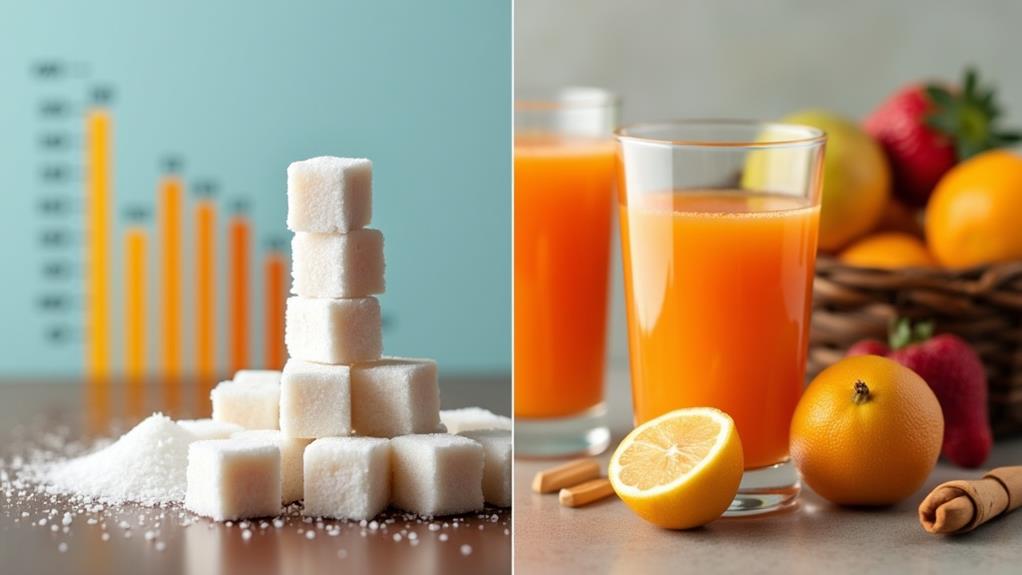
Understanding the impact of fruit consumption on blood sugar levels is essential for maintaining general health. Whole fruits, due to their high fiber content, slow the absorption of natural sugars, leading to a gradual rise in blood sugar levels. This gradual increase helps manage blood sugar more effectively and reduces the risk of developing type 2 diabetes. The fiber in whole fruits acts as a buffer, ensuring steadier blood sugar levels.
Conversely, fruit juices lack this fiber, leading to rapid spikes in blood sugar. For instance, consuming a medium orange, which contains 12 grams of sugar, results in a more controlled blood sugar response compared to drinking a cup of orange juice, which has 21 grams of sugar. The glycemic index of whole fruits is generally lower than that of fruit juices, making whole fruits a better option for stable blood sugar levels.
Research indicates that replacing fruit juice with whole fruits can lower the risk of developing type 2 diabetes by 7%. This underscores the importance of fiber in blood sugar management. Additionally, insulin release is more pronounced after consuming fruit juice, which can lead to increased hunger and potential overeating.
Satiety and Hunger
Consuming whole fruits instead of fruit juices can significantly influence your feelings of satiety and hunger. Whole fruits are rich in dietary fiber, which is essential for making you feel full and effectively regulating your appetite. In contrast, fruit juices lack this crucial fiber, often leading to increased hunger.
Research indicates that eating whole fruits, such as apples, results in greater satiety compared to drinking apple juice. Participants in studies reported feeling notably fuller after consuming whole apples than after drinking apple juice. The fiber in whole fruits slows sugar absorption, resulting in more stable blood sugar levels and prolonged satiety. On the other hand, fruit juices can cause rapid spikes and drops in blood sugar, making you feel hungrier sooner.
Whole fruits also support balanced energy intake by offering fewer calories while promoting satiety. Conversely, fruit juices often contain concentrated sugars, leading to higher calorie consumption and increased hunger. Regularly consuming whole fruits has been linked to better appetite control and weight management, whereas higher intake of fruit juice is associated with an increased risk of obesity and related health issues.
Health Risks of Juices
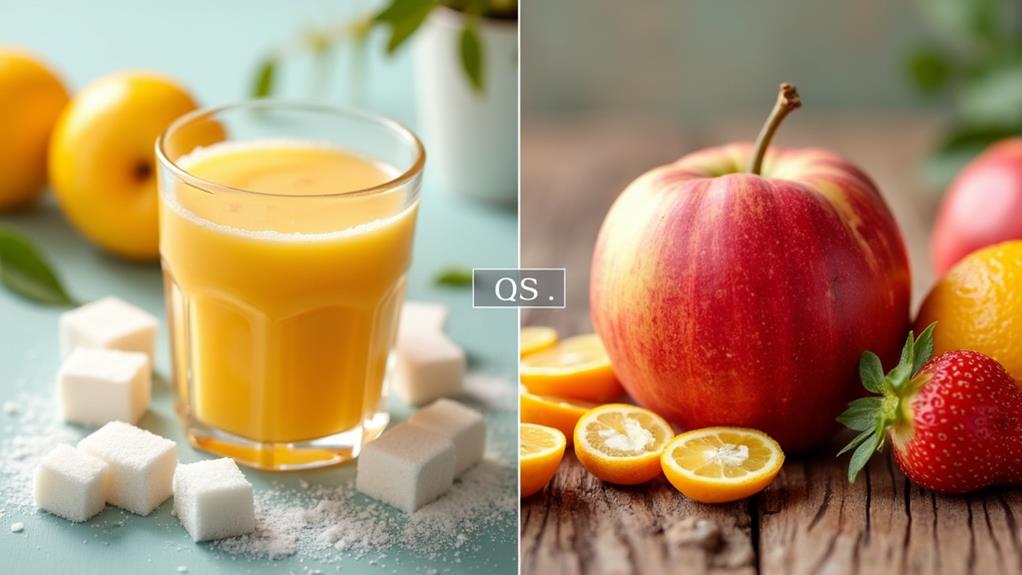
Opting for juice instead of whole fruit means missing out on essential dietary fiber, which plays a key role in digestive health and blood sugar control. The high sugar content in juices can lead to rapid blood sugar spikes, increasing the risk of type 2 diabetes. Additionally, juices tend to have higher caloric content than whole fruits, contributing to weight gain and obesity.
Nutrient Loss in Juices
Juicing might seem like a convenient way to consume fruits, but it comes with notable drawbacks. When you juice, you lose fundamental dietary fiber, which is vital for digestive health and helps regulate blood sugar levels. Without this fiber, you may experience blood sugar spikes that wouldn't occur if you ate the whole fruit, potentially leading to weight gain and negating the health benefits of consuming fruits.
The extraction process also diminishes the nutrient profile. Many beneficial compounds, like flavonoids, are found primarily in the pulp and skin, which are discarded during juicing. Consequently, you miss out on a significant portion of the nutrients when you opt for juice over whole fruits.
Moreover, freshly made juices can harbor harmful bacteria if not consumed quickly, posing health risks. This risk is less prevalent when consuming whole fruits. Studies show that replacing fruit juice with whole fruits can considerably lower the risk of chronic diseases like type 2 diabetes and hypertension. Eating whole fruits rather than drinking juice provides a more complete package of nutrients and health benefits.
Sugar Content Concerns
A closer look at fruit juices reveals a significant concern: their sugar content. For example, a cup of orange juice contains about 21 grams of sugar, whereas a medium orange has only 12 grams. This higher sugar concentration in fruit juice can be problematic. Additionally, you consume more calories—112 per cup of juice compared to just 65 in a whole orange. This extra caloric intake can contribute to obesity if not managed properly.
Regular consumption of fruit juice has been linked to an increased risk of type 2 diabetes. Studies indicate that replacing fruit juice with whole fruits can lower diabetes risk by 7%. The reason is the low fiber content in juice, which leads to rapid sugar absorption and spikes in blood sugar levels. This is particularly concerning for individuals with insulin sensitivity.
High sugar intake from fruit juices can also lead to obesity and related health issues. Without the fiber found in whole fruits, juices don't provide the same sense of fullness, making it easier to consume more calories than needed. For better health, consider opting for whole fruits instead of juice.
Benefits of Whole Fruits
Opting for whole fruits over fruit juices provides numerous health benefits that can significantly enhance your overall well-being. Whole fruits maintain essential dietary fiber, which aids digestion and promotes a feeling of fullness. This fiber also plays a crucial role in regulating blood sugar levels, thereby lowering the risk of chronic conditions such as type 2 diabetes and cardiovascular disease. Incorporating whole fruits into your diet can help with weight management, as the fiber increases satiety and prevents overeating.
The natural sugars in whole fruits are absorbed gradually due to their fiber content, resulting in more stable blood sugar levels compared to the rapid spikes caused by fruit juices. Additionally, whole fruits offer a richer nutrient profile, including vitamins, minerals, and beneficial phytochemicals like flavonoids found in the pulp and skin, which are often lost during the juicing process.
Regular consumption of whole fruits is linked to a reduced risk of obesity and other chronic diseases due to their nutrient density and high fiber content. Therefore, by choosing whole fruits, you are making a wise decision for your long-term health.
Juice Preparation Safety

While whole fruits offer numerous health benefits, preparing juice at home or choosing commercial options requires careful attention to safety. Freshly made juice can harbor harmful bacteria if not consumed quickly, so it's essential to drink it immediately to minimize health risks. Practicing proper hygiene and ensuring all equipment used during juice preparation is clean can prevent contamination.
For commercial juices, pasteurization is crucial in eliminating bacteria and pathogens that can be present in raw juice. Always check labels to confirm that the juice you're purchasing has been pasteurized.
Homemade juices should be stored in the refrigerator and consumed within 24 hours. This minimizes the risks of spoilage and bacterial growth, ensuring your juice remains safe to drink.
Additionally, be mindful of the fibrous parts of fruits and vegetables that juicing machines often discard. These parts contain significant nutrients and fiber, so finding ways to incorporate them back into your diet is vital for balanced nutrition.
| Key Practices | Significance |
|---|---|
| Drink freshly made juice | Minimizes health risks from bacteria |
| Use clean equipment | Prevents contamination |
| Confirm pasteurization | Ensures commercial juice safety |
| Refrigerate homemade juice | Reduces spoilage and bacterial growth |

